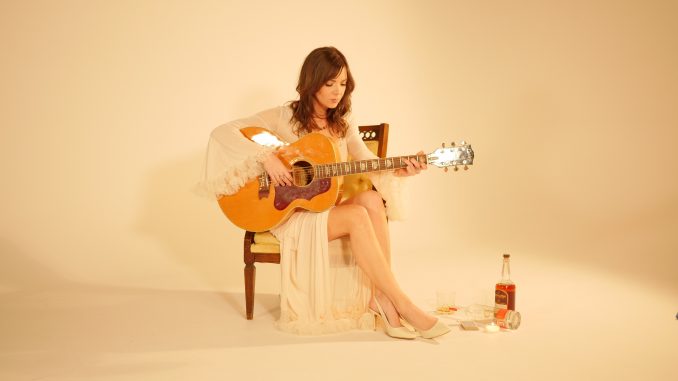
Ahead of her UK tour Karen Jonas talks about her latest album.
A decade ago Karen Jonas released her debut album, “Oklahoma Lottery”. Since then the Fredericksburg, Virginia-based Jonas has been quite prolific, releasing six albums, the latest being “The Rise And Fall Of American Kitsch”. She’s built up quite the fan base over here after several well-regarded tours and is about to embark on her most ambitious UK tour which takes her to Scotland and Ireland for the first time. “The Rise And Fall Of American Kitsch” (reviewed here) finds her delving into the concept of consumerism and its resulting detritus but the fulcrum of the album is loosely inspired by Elvis Presley’s journey from hip-swivelling rocker to Las Vegas icon. AUK spoke to Jonas via a Zoom call to discuss the new album and we started off by asking her how she got the idea to build the album around this concept.
Well, for me all of my records have a bit of a theme to them, “The Restless” was a very French, romantic and dreamy sort of record and “The Southwest Sky And Other Dreams” was very much about the southwest. For “American Kitsch” I had the idea for the record before I recorded “The Restless”, it was planned to be the follow-up to “Southwest Sky” but then I got very distracted when I started to write the songs which ended up on “The Restless” so I released that instead last March. And then we went to SXSW for the album release and on the plane trip home I watched Baz Luhrmann’s “Elvis movie”. Now I don’t watch a lot of movies but I really got into it and as I was watching I was taking all these notes on my phone just because I thought it was so beautiful, the colours were great and the story was great and when I got home I sat down and wrote eight Elvis inspired songs in just a few days. I had been thinking it was too early to start recording a new album but I remembered my original idea for “American Kitsch” and I reckoned the songs I had for that were pretty much telling the same story so they all swooshed together quite perfectly and that became “The Rise And Fall Of American Kitsch”.
For you, does Elvis represent American kitsch and if so, which period of Elvis?
I don’t think that Elvis himself is kitsch, I think he was a beautifully inspired artist but when he first appeared it was in the post-war age of easily manufactured plastic which led to everyday middle-class and suburban families thinking you could just buy a lifestyle. I think that we commodified art in the same way that we commodified everything else at that time and Elvis became a product of that and the end result of that product is kitschy. Elvis was a true artist but the way he was sold, it became kitsch. And, don’t get me wrong, I love kitsch, I love stuff, I love pretty things but I think there’s a dark side to it too and that’s what I was exploring on the record.
So, are you a collector of kitsch?
I don’t collect very much, I try not to. I have four kids and four cats and that’s all I have space in my house for.
Aside from the kitsch and glamour side of Elvis you look into his reliance on pills and such on ‘Call Dr. Nick’?
That’s part of the darker side I was talking about, of trying to solve problems with the wrong solutions. Dr Nick was certainly the wrong solution for Elvis who was under so much stress and it was what finally did him in at the end. But I like a good snake oil salesman song and Dr. Nick, for me, was like the man standing on a wagon trying to sell you a little vial of something that is probably going to do you more harm than good. That’s my vision of Dr. Nick on that song.
After watching the movie and deciding to write the songs did you do a lot of research into Elvis?
I wouldn’t say that I did a lot of research. I had some pretty good visions for the songs from the movie and the notes that I made so I only had to really delve in on a couple of things. Like, for ‘Call Dr. Nick’, I really wanted to have a drug name to fit and one that Elvis was actually prescribed so I had to look up lists of all the medications he was on. And I looked at drone footage of Las Vegas and compared it to vintage Las Vegas posters to get a picture of the now and then of the city. But I didn’t really look much into Elvis himself as the songs I wrote around him were pretty much my own vision of what was happening.
But a song like ‘Four Cadillacs’ is surely inspired by his habit of gifting cars
Yes, there’s one scene in the movie where they mention that and I kind of extrapolated it into that song.

You say on the record that consumerism is the new religion and on the title track you address the issue of what to do with all the plastic trash that results.
That’s something I’ve seen a lot of with raising my kids. They always want the latest thing, the newest plastic gadget but in no time at all they’re no longer fascinated with it and it just becomes trash. We throw out last year’s Christmas presents and birthday presents, things we spent money on. At home I haven’t fixed it, I don’t know how to get around it but I see it happening all over and it worries me. There is joy there, I remember as a child my mom taking us to get Beanie Babies or a McDonald’s kiddies meal with the toy and it was fun, I loved it, but on the record there’s a lot of stories about people trying to solve big problems with small solutions that aren’t the real solutions to their problem, that search for meaning or joy or happiness.
You mention that on ‘Online Shopping’ where the protagonist doesn’t even have to get out of her bath to place her orders at the press of a button.
That’s right, you can just sit there and press that button and that ties in with the final song, ‘Buy’. But it’s not just buying the stuff, it’s how you think that stuff is going to change you, make you the person that you want to be. I mean you do have to buy things, you need tools and food and things like that, there’s some reality there but most times you are just buying garbage.
On ‘Let’s Go To Hawaii’ it’s a dream that’s being sold.
I was a big fan of “Mad Men”, the TV series about the advertising industry. It showed you how in the 60s they perfected ways of selling you your dream and we’re very susceptible to it. I’ve never been to Hawaii but I took some time to look at vintage travel posters and the like and I was sold, I thought, this looks pretty great, I’d like to go there. And then, because it was about Hawaii I thought of Jimmy Buffett. I love Jimmy Buffett, he’s another artist who a lot of folk see as kitsch but I think he was a genius story teller, he could casually put some words together in a way that was conversational but also very meaningful to people. But there is a lot of kitsch in songs like ‘Margaritaville’ and it’s wild how he created such a huge business behind songs like those.
In terms of American kitsch, two places stand out, Las Vegas and Miami and you mention both on the album. There’s a contrast with Las Vegas and the lurid neon lights and Florida with its pastel pink buildings but on the song ‘Plastic Pink Flamingos’ you find some darkness in amidst the pretty colours.
Yeah, it seems cute and sweet at first but then she goes off the deep end and I think that’s where the records turns from the ideal type of kitsch to searching for solutions for the problems we’ve created. In the song she’s this nice lady who collects plastic pink flamingos and that’s nice but by the end of it she’s had a full psychotic break and is guarding her flamingos, ready to go to war for them. But that’s the mania, the hysteria of purchasing right there. You’ve seen videos of people at Wallmart on Black Friday fighting over boxes.
The music on the album is quite varied. There’s country and rock’n’roll, the Jimmy buffet like Caribbean songs and even some easy listening, finger popping pop on ‘Online Shopping’. How do you go about deciding how to develop the musical style for each of your songs?
I start to write all my songs on acoustic guitar and from there I bring them to my band and we sit down and work them out. These songs were pretty much well developed by the time I took them to the band as I had written them so soon after the last record came out. I had a lot of time to work on the songs, add bridges and things so it was pretty much all my own vision when I eventually started playing them with the band. We don’t worry too much about whatever genre something might be called when we’re creating music, I think that can be a little bit constraining. So this is just how each of these songs told a story to me and there are a lot of different stories on the record, they range quite a bit and so does the music.
On one song in particular, ‘Gold In The Sand’, I thought you were trying to get a 1960s Elvis ballad sound on it.
Well you could say that we were trying to sound like him or you could say that that’s what the song is. It comes from that same place, that soft love song, neon light starry night kind of place because that’s what it sounded and looked like to me.
What can we expect to hear on the upcoming tour?
It’s the same line up as last time we were over, it’s me, Tim Bray and Seth Morrissey. We’ll be playing much of the new album and some older songs, we sometimes like to revive an older song that’s dropped off the set list and we’ll do a few covers, songs folk will either know or not know but they’ll be some of my favourites.
Speaking of covers why did you record and release Don Henley’s ‘Boys Of Summer’?
I don’t know, I was really just fascinated with it at the time. Sometimes I’ll learn a cover and play it just for a few days and sometimes it will just stick and that one really stuck. I just felt so strongly about it and we’ve still been playing it in the live show this year.
Gordon Lightfoot’s ‘If You Could Read My Mind’ is another song you seem to really admire
Again, I love that song but it’s fallen off the set list recently. We have added Dusty Springfield’s ‘Son Of A Preacher Man’ to the show.
Anything else you want to say about the album?
Sometimes when I talk about the album it seems quite dark inside and serious but I want to emphasise that it’s actually quite bright and fun as a listen. You can dig into the darker themes if you want but I’m really proud of all the joy you can hear on this record.
Karen Jonas’s tour commences on 1st October, all dates here.



